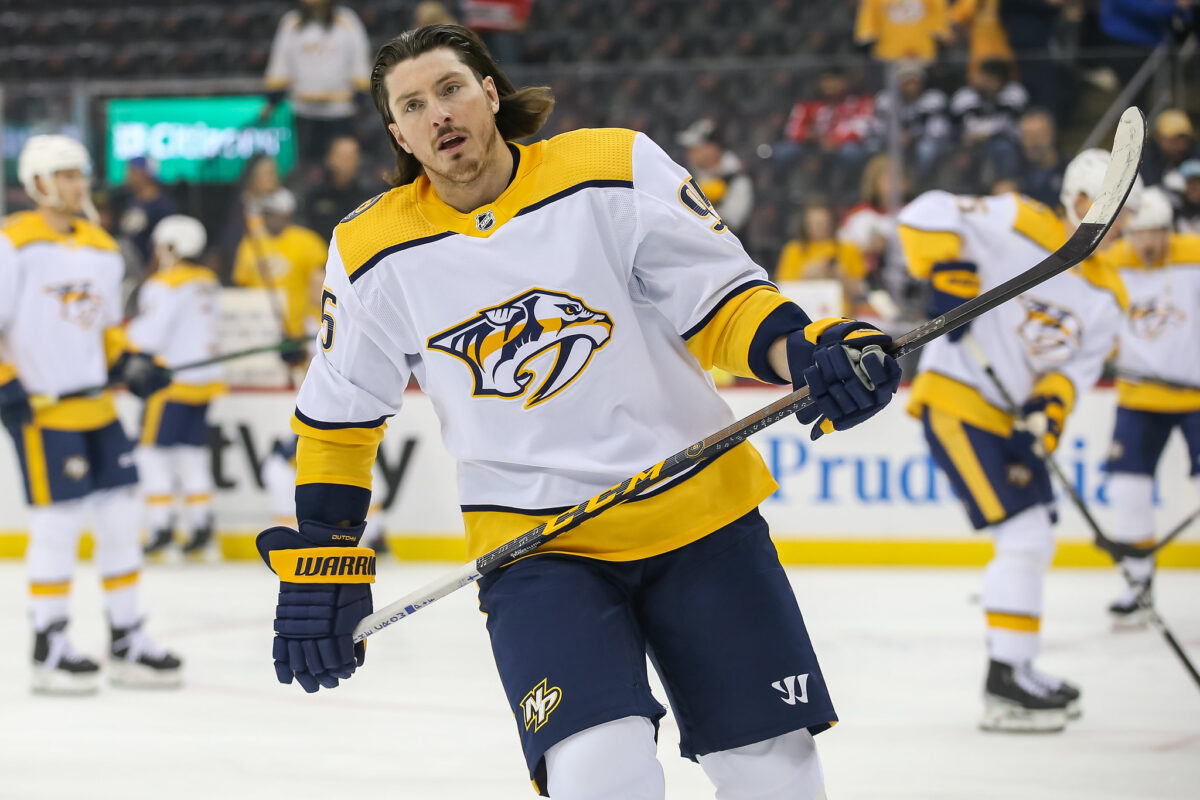The Nashville Predators missed the 2023 NHL Playoffs by three points, falling behind the Calgary Flames and Winnipeg Jets in the Western Conference wild-card race. This season marks the end of an eight-year playoff streak they were on. Despite this, their 42 wins on the season are tied for the most by any team that came short of the postseason this year. A dramatic shootout win over the Flames may be the highlight of the season for the Preds, but all of it doesn’t matter at the end of the day. Here are three reasons why the Predators missed the playoffs.
Predators Sold at the Trade Deadline
Sometimes the obvious answer is also the correct one. The Predators are the team that sold the most at the trade deadline. Typically, a dramatic playoff push does not come with this honour, with each game being the root of stress and anxiety for the Predators’ faithful. Fortunately, or unfortunately, depending on one’s outlook, that was the result. Mattias Ekholm, Tanner Jeannot, Mikael Granlund, and Nino Neidereitter were the staggering names moved from their roster —three top-nine forwards and arguably their second-best defencemen were gone in a week.
The Predators remaining competitive in the playoff hunt after unloading the talent they did was impressive. All signs pointed towards entering a re-tool with sights locked on dropping into the Connor Bedard sweepstakes. Instead, first-year players such as Thomas Novak and Luke Evangelista emerged as players ready to take the reins, emerging as replacements for the traded players. The kids looked great, but naturally, trading four quality NHL players sunk their playoff odds.
Predators’ Awful Injury Luck
The Predators’ injuries were the straw that broke their back down the stretch. Week after week, a star player would succumb to an injury, making their roster resemble their American Hockey League affiliate, the Milwaukee Admirals, more than their own. The players to miss significant time with injuries included Roman Josi, Matt Duchene, Filip Forsberg, Ryan Johansen, Ryan McDonagh, Mark Borowiecki, and Alexandre Carrier. Each player missed at least 11 games this season, with Forsberg and Johansen missing 32 and 27, respectively.
Forsberg, Josi, Johansen, and Duchene suffered season-ending injuries down the stretch, hurting their playoff push when they desperately needed to secure as many points as possible. Between them, the four players missed 85 games, a staggering number to miss from a team’s core four. Naturally, any team missing that many games from their top producers will struggle, making the Predators’ struggles understandable. If they do not lose their star players for extended periods, perhaps it would be the Winnipeg Jets that miss the playoffs, but if ‘ifs and buts were candy and nuts,’ the Predators would have won the 2017 Stanley Cup. ‘What If?’ is always fun to think about, although, in this situation, it may prove to be sad rather than fun.
Related: 5 Reasons the Flames Missed the 2023 Stanley Cup Playoffs
Despite these injuries, Tyson Barrie played more than his fair share of NHL hockey this season. One of the few players entering the Predators organization at the deadline, he played 85 games this season, one shy of tying the NHL record for most games in a season. The record, 86, is held by Jimmy Carson and Bob Kudelski.
Predators’ Offensive Woes
The Predators’ poor offensive production is a trend that began at the beginning of the season. Thanks to the trades and injuries listed above, the woes only worsened as the season progressed. However, in the NHL, making excuses does not get an organization closer to its goal of the Stanley Cup. They sat 28th overall in goals per game, with 2.72, averaged only 29.5 shots on goal for 23rd in the NHL, and had an abysmal powerplay, sitting at 17.6 percent, finishing at 27th overall. And these are just the numbers that meet the eye test.

The Predators’ 9.2 shooting percentage could be attributed to some bad luck if the advanced stats supported it; however, that is not the case. They only had a 47.42% Corsi For at five-on-five and it only jumped to 47.52% when accounting for all situations. Additionally, their expected goals sat at 47.29%, 25th in the NHL. Whether taking the product on the ice at face value or using ‘fancy stats’ to back up these claims, the Predators’ offense did not contribute to winning hockey.
Roman Josi was the Predators’ leading scorer this season with only 59 points. This number left the Preds as one of just two teams to have no players reach the 60-point mark, the other being the Chicago Blackhawks. While he did miss 15 games with an injury, the reason for his low totals, it is evident that the lack of scoring is a flaw the team needs to resolve to be in contention for the playoffs next year.
The Predators are entering a re-tooling phase, meaning their late-season surge may be the last fans witness for a few seasons. With Norris and Vezina Trophy calibre players in Josi and Juuse Saros, that statement can become outdated quickly; however, the team selling at the trade deadline and inability to stay healthy show that they are gearing up for a few seasons of pain before Bridgestone Arena is booming with playoff hockey again.
Advanced stats were taken from Money Puck